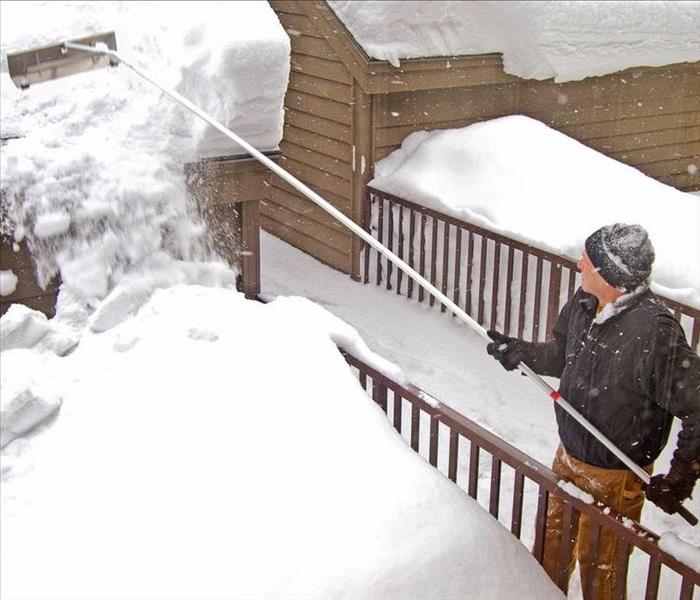3 Ways Winter Storms Can Damage Your Home
12/9/2019 (Permalink)
Winter storms can be surprisingly destructive, even without record-breaking snowfall. Ice is dangerous long after the storm passes, not only when it falls, but also as a potential flooding hazard. To avoid an emergency, keep an eye out for the following conditions — or you may need water cleanup and restoration services this winter.
3 Wintertime Flood Hazards
Ice Dams
If a house isn’t correctly ventilated in the attic, heat will rise through the roof peak, causing the center of the roof to be warmer than the edges. After a snowstorm, this uneven temperature distribution causes the snow to melt at different rates. Ice then accumulates near the perimeter and keeps snow-melt from draining through the gutter system. This process is called ice damming. As the snow melts, water can dislodge the shingles and roof flashing and even pry apart gutter seams. Because water expands when it freezes, the cycle of freezing and thawing can magnify this damage.
If ice dams form on your gutters, water can eventually permeate the roof and cause wood-rot, mold, and drywall damage in your attic.
To combat ice dams:
- Use insulation and caulk to keep the attic and roof cold.
- Add roof and soffit vents to improve the ventilation outside your home.
- Install a waterproof under-layer beneath the roofing shingles.
Snow Accumulation on the Roof
Another potential risk during the winter is snow accumulation. If heavy snowdrifts form on your roof, the weight can cause the structure to collapse. Various factors, such as the pitch and condition of your roof, affect the likelihood of this scenario. In general, if your house is up to code, it should be able to withstand average snowfall. For more information about snow accumulation on the roof, check the Federal Emergency Management Agency website.
Frozen Pipes
Frozen pipes are typical during the winter, especially in unheated rooms with water pipes, like the basement. Water sprinkler lines and hose bibs are also more susceptible to freezing, as the pipes are along exterior walls.
When a water pipe freezes, pressure builds until the pipe bursts. This usually causes flooding until the supply line is turned off. A frozen pipe typically requires water cleanup services.
To keep pipes from freezing:
- Insulate pipes with specially designed foam sleeves.
- Heat areas of your home that have water pipes.
- Winterize outdoor plumbing fixtures, including sprinkler systems, pools, and garden hoses.
If a storm hits your home or business in the Westmoreland, NH area, call the experts at SERVPRO of Cheshire County at (800) 352-7251 for immediate water cleanup and restoration services. Our company is locally owned and operated yet comes with the support and resources of a nationally recognized franchise.





 24/7 Emergency Service
24/7 Emergency Service
